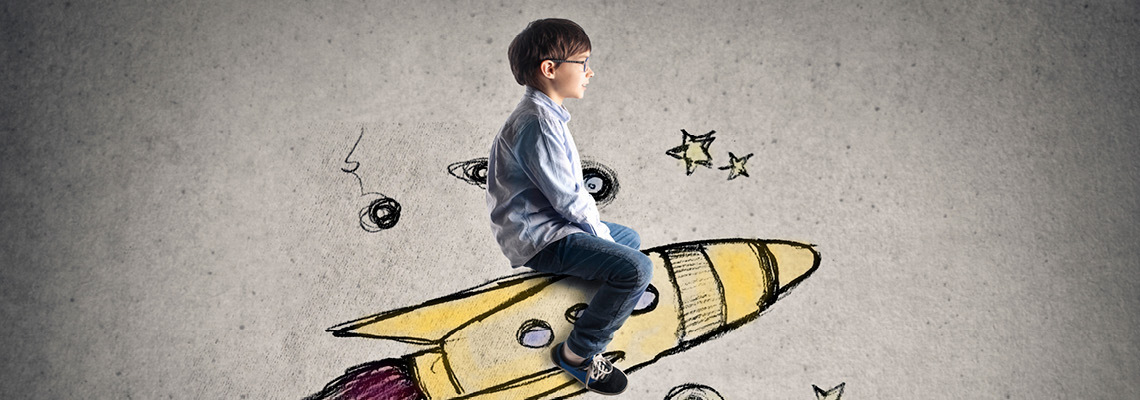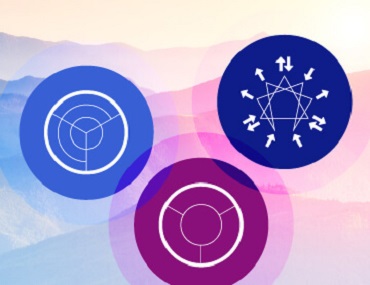One of the questions we often hear from new clients or newcomers to the Enneagram is “Where does my personality come from? Why am I this Type?” The answers to these questions are to be found in theories of early childhood and psychological development. This article explores the link between childhood and Enneagram Type and offers guidelines and tips for coaches on how to approach and answer these questions for their clients.
Early childhood personality
The well-known saying "Give me a child until he is seven and I will show you the man" is attributed to historical figures including St. Ignatius Loyola and Aristotle. It reflects a common idea in both ancient philosophy and modern psychology, that the fundamentals of personality – our worldview and assumptions about what it means to be human – are largely established by the time we are around 7 to 10 years of age.
Throughout history and within various scientific fields, there are varying theories and explanations of how or why this comes to be. Most experts agree, however, that the basis of an individual’s personality is formed in early childhood, before the age of 10. It is at this early age that children develop an understanding of this strange and often confusing world they live in. Even more important for their personality formation, this is the age at which they start to figure out what it takes to be a person who fits into that world and who will be safe there. These core assumptions form the basis of personality and as a result, our future Enneagram Type.
Collectively, over time, these characteristics form our personality – but we forget they are just a collection of coping mechanisms and we begin to identify with them as our personality. The Enneagram not only reflects our personality but also what lies behind it so that we can choose how we interact and show up in the world.
Nature or nurture?
An age-old question in human development is ‘nature or nurture?’. In other words, is personality a function of our genetics (nature) or our upbringing and environment (nurture)? While we do not have definitive proof of the origin of personality or Enneagram Type, we know that both nature and nurture are likely to play a role.
For example, twin studies research what happens when two individuals with the same DNA are raised in different environments versus when they are raised together in the same family. These studies suggest that up to 49% of the core traits that lead to personality are genetically determined and approximately 51% is shaped by environment.
So, it seems that we may be born with certain dispositions or ‘wiring’; newer research suggests that personality may even be influenced by feedback and experiences that happen while we are still in the womb. Once we arrive in the world, our early childhood is a process of experimenting and learning all the things we need to be human. In this process, our busy little brains are learning about what the world is, what is ‘acceptable’ behaviour, what is expected of us in the world, and who we are supposed to be.
EXAMPLE: When little Max behaves with politeness and manners and the adults around him are pleased, he gets warmth, positive feedback and acceptance. At that moment in his brain, a neural pathway forms, which says, “If I behave in this way, I am worthy of receiving love”.
As we do this, our brain is building neural pathways that shape our mental models and ‘wiring’. When something happens and a neuron fires, a pathway is laid down – but at this early stage it is still very flexible and not fixed. When patterns are repeated, however, the neural pathways become stronger and stronger, and long-lasting beliefs, connections and memories form.
EXAMPLE: Each time Max repeats this good behaviour, he receives the same positive feedback and reinforcement and the pathway is reinforced. As a child, however, Max is actively experimenting with different ways of being. When he occasionally does not behave in an ideal way, the reaction is negative – again, reinforcing the belief and the pathway.
The child’s brain now associates good behaviour with love, and rebellion with rejection. His brain ‘learns’ that from then on, to receive love or acceptance he must act a certain way and he may focus on being good and well behaved, to the exclusion of many other issues and concerns.
Personality in late childhood and adult development
This particular child may grow up to become the kind of individual referred to as a Type One in the Enneagram typology, a person who is focused on being good and right above all. This becomes both his greatest strength and a potential limiting factor as he grows into adulthood.
His early childhood programming becomes subconscious ‘wiring’ that underpins personality. This basic ‘knowledge’ about the world – that the world is a black and white place, that only ‘good’ and polite behaviour will be rewarded and where standards must be maintained – becomes a perspective or paradigm that acts as a filter to his observation of the world around them.
EXAMPLE: Enneagram Ones go about the world painfully aware of everything that is not correct, drawing black and white lines and judging themselves and others through this filter. This, in turn, leads to feelings of frustration and anger and a set of behaviours aimed at making things orderly, right, and correct.
These early experiences continue to colour our development, including our future choices, possibilities, and experiences. While many development approaches do not touch on our earliest experiences, often resulting in us being stuck and limited by our earliest learned behaviour, the Enneagram reveals these deep-set motivations and the filters they create for us. It offers us a pathway into a deeper level of reflection on who we are and how we see the world and opening up more possibilities and avenues for change that takes us beyond our limited, limiting childhood wiring.
Don’t look back in anger
This idea of Type being formed in early childhood may raise a challenge for coaches for a number of reasons, both ethical and practical. Many coaches are quite rightly cautious around the implication that we might take clients back to early, often painful childhood experiences – an avenue that is more typically appropriate in a therapy context rather than in a coaching session.
It is important to remember and to remind your clients:
- If personality and, by implication, Type is formed so early in our childhoods, we must accept that even our memories and sense-making of these events may not be entirely reliable. The reality is that we form these assumptions and beliefs about the world when we are still very young and immature. Children can take even positive messages and distort them in the process of personality formation. For example, a child who is raised by a very loving parent and constantly praised for being quiet, lovely and easy may assume the implied message is that they must continue to be this way, creating anxiety and potentially driving them towards personality fixation.
- Your childhood does not have to be disruptive, bad, unhappy or abusive in any way for these effects to happen. Some clients may resist the idea of Type being formed in childhood because they are attached to a positive image of their family and childhood and, therefore, do not see how their ‘happy childhood’ could have led to current challenges. For these clients, it can be helpful to acknowledge that even happy, well-adjusted families can be stressful or confusing for young people at times. Everyone has a personality, even people with happy childhoods.
- The reality is that we form these assumptions and beliefs about the world when we are still very young and immature. Children can take even positive messages and distort them in the process of personality formation. For example, a child who is raised by a very loving parent and constantly praised for being quiet, lovely and easy may assume the implied message is that they must continue to be this way, creating anxiety and potentially driving them towards personality fixation.
- Clients may ask, in their role as parents, “did I do this to my child?” and the answer is both yes and no. Many parents feel guilt for their children’s Type and the role they and their family may have played in shaping that personality during childhood. The reality is that no parenting strategy can prevent a child from developing a Type with all its complexities. Everyone gets a personality, every Type experiences its own difficulties, and no Type is better than any other. No matter what, each person will have one of the nine personality Types and an associated set of challenges, but also associated strengths and gifts. For parents, focusing on accepting their children for the unique individuals they are is a more powerful path to support them as adults.
- Many clients may have real and valid regrets, resentments, and unprocessed issues from their childhoods. Understanding these experiences can help them to illuminate their blind spots and fixations. However, these past experiences are often traumatic and difficult to interpret and we recommend a therapeutic context for best results in processing these.
No matter the kind of past a client had, we all arrive in the present moment with gifts and challenges and with one lifetime to live. We encourage you to encourage your clients to become present in the current moment and, rather than looking back in anger, to look forward to the future, focused on building the new.
The Enneagram offers a pathway into deeper levels of reflection on who we are and how we see the world, potentially freeing us from some of the limiting beliefs and filters we have been struggling with for so long. This opens up possibilities and avenues to change and to expand this limited childhood wiring, taking back ownership of our journey.

 What is the Enneagram?
What is the Enneagram?
 Introduction to the 27 Subtypes
Introduction to the 27 Subtypes
 Introduction to the 3 Centers
Introduction to the 3 Centers
 Wings
Wings
 Lines and Integration
Lines and Integration
 Enneagram History & Origin
Enneagram History & Origin
 Enneagram for Myself
Enneagram for Myself
 Enneagram for Practitioners
Enneagram for Practitioners
 Enneagram for Business
Enneagram for Business
 iEQ9 Individual Reports
iEQ9 Individual Reports
 iEQ9 Team Reports
iEQ9 Team Reports
 iEQ9 Questionnaire
iEQ9 Questionnaire
 Training Events
Training Events
 Level 1 iEQ9 Accreditation
Level 1 iEQ9 Accreditation
 Level 2 Enneagram Team Dynamics
Level 2 Enneagram Team Dynamics
 International Enneagram Conference
International Enneagram Conference
 iEQ9 Community of Practice Events
iEQ9 Community of Practice Events
 About Integrative9
About Integrative9
 Meet the Faculty
Meet the Faculty
 Testimonials
Testimonials
 Contact Us
Contact Us



